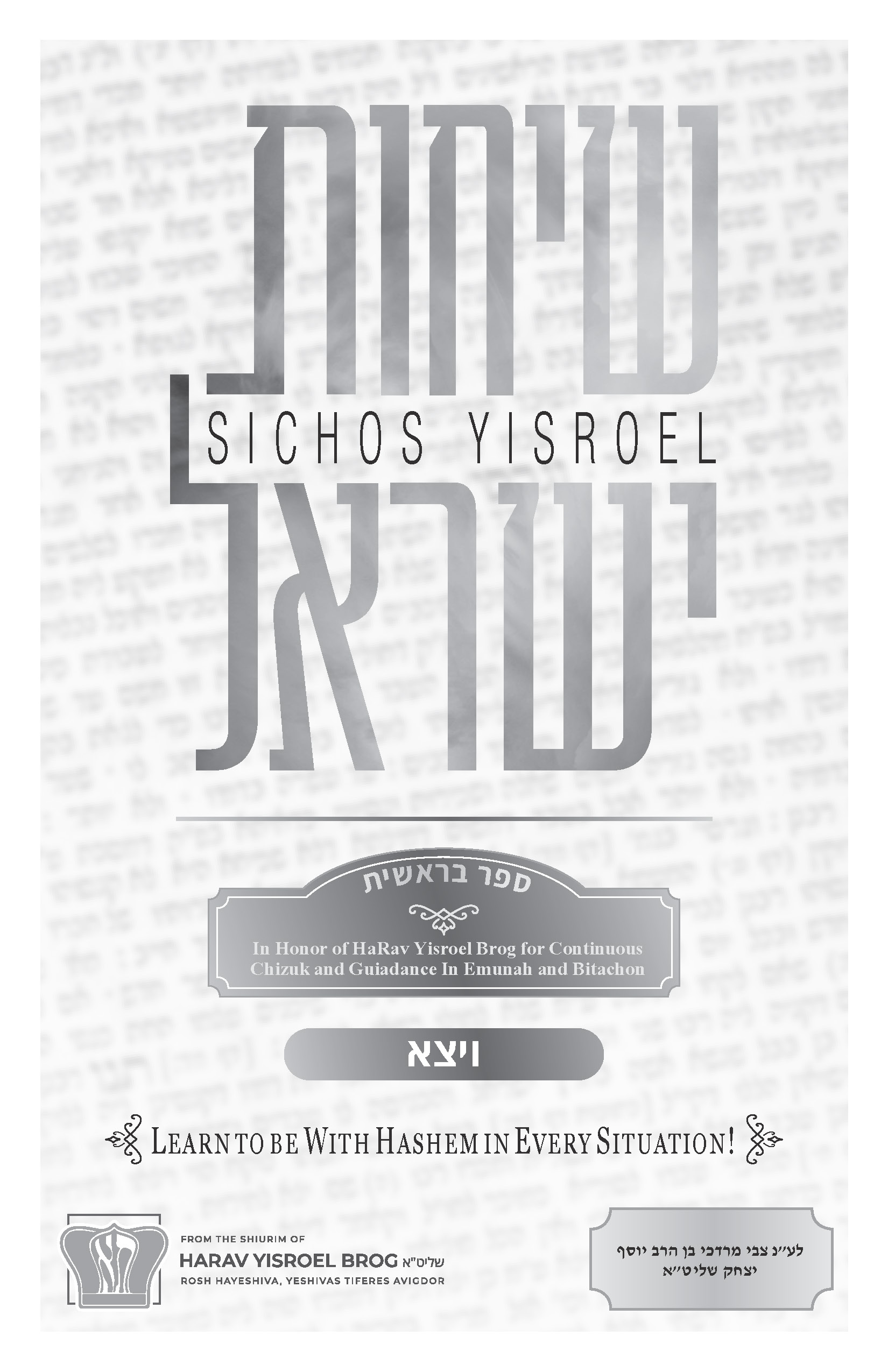Vayeitzei 5783: Learn to be With Hashem in Every Situation!
Sponsored
לע”נ צבי מרדכי בן הרב יוסף יצחק שליט”א
Consider sponsoring a shiur
Visit YTATorah.org
Shiur presented in 5778
Parshas Vayeitzei: Learn to be With Hashem in Every Situation!
Getting Married Without Any Money
In the past, we mentioned a medrash (Bereishis Rabbah 68:2) that describes how Yakov Avinu was going to look for a shidduch, but was faced with a dilemma: he was penniless.[i] He had nothing at all because he had been robbed. He was accosted and lost everything. But he accepted it as a nisayon from Hashem. My Rebbi (Rav Meir Soloveitchik, zt”l) pointed out that Yakov Avinu faced very evil adversaries many times in his life, and situations where people usually stand up in their own defense. Yakov Avinu was a person of immense physical strength. You would have expected him to call his kids together and say, “Kinderlach, come we’re going to pay someone a visit and we’re going to explain to him that we don’t like getting taken advantage of.” But Yakov Avinu did not do that. Yakov Avinu never even thought of that idea. He always sought to turn to Hashem, and find the answer to his dilemma by understanding how Hashem wanted him to respond.
Now he was faced with a dilemma of a shidduch, and he thought to himself, “I have nothing. How can I get married if I have zero? Even my father did not get married in this fashion.” Then he said, “No, I’m going to turn to Hashem.”
My Rebbi gave another explanation of this medrash. He said, if you look in the sefer Nefesh Hachaim from his great-great-great-grandfather, Rav Chaim Volozhiner, he establishes a very important principle and that is, that the way Hashem is noheg, the way He runs the world, or the way He deals with an individual, depends upon what the individual is kovei’a, what he establishes.[ii] Everybody ‘orders from the menu’ of how they want Hashem to deal with them.
If you were ever a rebbi, you’d know that there are some talmidim who come and say, “Rebbi, please be hard on me. Don’t be light on me.’ And other talmidim say, “Rebbi, please, just ignore me. Don’t be hard on me.” Some say this. Some say that.
Everybody subconsciously has a ‘menu’ from Hashem, and that ‘menu’ determines how Hashem conducts Himself with you. Meaning, the way a person is noheg down here in this world, that’s how his world is mesnaheg. The whole attachment, the whole kesher, the whole draw from the bank of Hashem into this physical world depends upon the pe’ulos ha’adam, the actions of a person.
The pasuk says ה’ צילך, Hashem is your shadow (Tehillim 121:5). What does that mean? Chazal (Midrash Agadah; see footnote #2) tell us that what that means is that the shadow reflects the movement of the person. Whenever he moves, his shadow moves, and the shadow could only follow the movement of the person or the movement of the object creating the shadow. You have to know Hakadosh Baruch Hu attaches Himself to this world according to the ma’asei ha’adam. The way you behave is the way Hashem conducts Himself with you. And this applies to matters of ruchniyus and gashmiyus.
Yakov Avinu was now on the way to go and marry a woman. When he thought about his matzav and he saw that he had no ability to do any hishtadlus to bring about his desired goal, he was concerned that maybe he wouldn’t be zocheh to a yeshuah, because the hanhagah depends on the hishtadlus and the hisorerus of the person himself.
So his first thought was, “I’m in a quandary. מאין יבוא עזרי – from where will my help come?” (Tehillim 121:1). That means: “I’m in a situation where it seems that although I want to get married, I don’t have the means and the wherewithal to effectuate that desire of mine. So how am I going to get married?”
Having a Yeshuah without Hishtadlus
On that he says, “I’m going to behave as follows: עזרי מעם ה’ עושה שמים וארץ – my help will come from Hashem, Maker of Heaven and Earth (ibid).” Just because a person cannot do hishtadlus, does that mean there is nothing to do? Yakov said, “Do you think I’m going to lose hope in my mission? Hakadosh Baruch Hu was the one who made שמים וארץ.” The creation of שמים וארץ was done without any pre-hisorerus, without any preparation from this world. Hashem was mazmin the world, He brought the world into being without the world having any zechus. So Yakov Avinu said, “I am certain that Hakadosh Baruch Hu is going to bring me the yeshuah even without any hishtadlus on my part because when a person cannot do hishtadlus, Hakadosh Baruch Hubrings him the yeshuah without hishtadlus.” That’s what he was saying with עזרי מעם ה’ עושה שמים וארץ, my yeshuah will come just like the בריאת שמים וארץ.
It means that post בריאת שמים וארץ, as a rule, the world works like this: you do some actions on your part, you do the best you can, you make your hishtadlus, you rely on Hashem, and then Hashem becomes your shadow and Hashem delivers to you results according to what you did.
But there’s another hanhagah when somebody can’t do any hishtadlus. There’s nothing to do. At that point, the person feels lost. No, he doesn’t have to feel that way. Hashem is the עושה שמים וארץ. The fact that Hashem created שמים וארץ tells us that when a person can’t do anything on his part, Hashem could do it for him without any hishtadlus, without any hisorerus on the part of the person. So he says, “I’m sure Hashem, that You will bring the yeshuah that I need.
This is a very important principle because there are people who have blockages when they want to get married, for example, or they have a medical issue, and they think, “I have a medical issue, so I can’t get married.” It sounds like a pretty tough thing to expect the medical issue to disappear because a lot of medical issues are part and parcel of a person’s life.
The Shidduch Who Everybody Dropped
I’ll never forget when a parent called me up to tell me about his son. Every time this boy goes on a shidduch, he gets dropped. He’s a very nice boy. He’s a good-looking boy, with a lot of ma’alos going for him, but when he tells them his issue, they drop him. He’s getting very depressed. They wanted to know if I could help him? I said, “Of course I can help him! Send him to me.” So he drove here from out of town. I met this fellow. He was a strapping young man. He looked better and healthier than most people. “Do you have a medical problem?” I asked him. “What’s the problem? You look good.” Then he told me that he had a medical problem. He told me what it was. And I said, “Oops.”
I said to him as follows. “Are you allowed to get married halachically with that medical problem?” He said, “I don’t know.” I said, “Let me tell you what to do. What I’ve done with young men in the past who came to me with a similar but not identical problem, is that I told them to gather their medical records and go pay a visit to Rav Dovid Feinstein. If he tells you you can get married, then you have to know that you have a mitzvah to get married. You have a mitzvah to have children and you will have children. Ai, you ask how is it going to happen? Hashem is going to make it happen.” I spoke to him for a long time and gave him a whole program to change his life, to boost his morale, to raise his energy. I just said, “There is one thing you have to know. It could be that your problem is your yeshuah. It could be that if you didn’t have any issues, you would meet the girl Hakadosh Baruch Hu wants you to marry and wouldn’t agree to marry her. So if something is not 100%, don’t be afraid to say yes and be prepared for that. Maybe you went through a boatload of rejections, because Hashem is preparing you for the right one to come.”
I’ll never forget. I really got him boosted up. He called me back. He went to Rav Dovid Feinstein. He made changes in his life. He took a lot of steps to get his morale up. I told him, “You have to know you’re getting married shortly. You have nothing to worry about.” I said, “You have to make Hashem your tzeil. You have to say, ‘Hashem, You put me in this world. You created me as a male. You enabled me al pi halachah to get married. It means the Torah tells me I have to get married. I have to try to have children. So please, Hashem, I’m counting on You.’” And he went, and he did it.
A short while later, somebody redt him a shidduch. The girl was on a very, extremely high professional level. I was shocked. It’s the kind of thing that when people hear this profession, they usually raise their eyes and say, “Wow.” And she wanted to marry him. He calls me up. “There’s a little problem.” I said, “What’s the problem?” “She’s not healthy. She has one small issue.” I said, “What’s the issue?” “The issue precludes her from driving. She can’t drive.” “So I know a lot of people who have no issues but they can’t drive because they’re nervous about driving. What’s the big deal?!” I said, “Is it not a fundamental issue!” It wasn’t fundamental. He told me what it was exactly. It was nothing major. I told him, “Didn’t I tell you a couple months ago that you should be prepared for this? Get married.” But I saw he was the type of person who could not jump on it. I told him, “If you’re not going to jump on it, you’re going to lose it.” Baruch Hashem, he got some sense in his head. He got married, and he had children. Baruch Hashem, he has parnasah. I told him, “Hashem took care of you. Most people struggle with parnasah and all kinds of things. You don’t have that issue. You have a wife who’s dedicated to you.”
A person has to know that when you have no hishtadlus to make, then you have to just go forward saying, “Hashem, I’m going to attach myself to You, and I’m going to make You my shadow. I’m going to live in Your shadow, and I’m going to create You as my shadow and then it’ll work.”
The Sign that Hashem is With You
Last night, I got a call that I don’t ever remember getting before. A young man calls me up. He doesn’t sound happy. He tells me he’s just a young man, in his young 20s. He got married. He went to one of the biggest doctors in the country, and after extensive tests, the doctor said to him, “You will never produce a seed. You will never produce a child.” He was understandably a little bit down. I gulped, and I said, “Wow.” I said, “What do you want from me?” He said, “My rebbi told me to call you.” I said, “Did you go to Eretz Yisrael?” “Yes.” “Did you go to Rav Chaim?” “Yes.” I said, “What happened?” “Rav Chaim told me I’m going to have children.” He said, “Not only that, Rav Chaim gave me a ksav yad. He pashut wrote me a shtar, a paper, that I’m going to have children.” I told the guy, “Why don’t you go out and buy a crib? Go out and buy a layette. What kind of business is this?” I said, “Don’t believe in Rav Chaim. You have to believe in Hashem, but Rav Chaim is your mishan.” I gave him a little pump up. I gave him a little shot in the arm. At the end of the phone call, he definitely sounded very different. I told him to keep it up and call me with the good news, and if he ever gets a little down, he should call me back.
It’s funny, because when he told me this story, I figured, ahh, that’s Yakov Avinu. Yakov Avinu had no idea how he was going to get married. Al pi pashtus he was not going to get married. If you can’t emulate your father’s mehalech, how are you going to get married? You have to know עזרי מעם ה’ עושה שמים וארץ. Sometimes there’s nothing that you can do. Then I added something. I said, “You know, you could have found this out before you got married. I know of young men who had questions before they got married, if they’re able to have children. They went to the doctors. I don’t know if you’re allowed to. It’s a big shaylah. It’s not so pashut. But let’s say the guy would have gone before he got married and the doctor would have told him, ‘You cannot have a child.’ You think this guy would have ever gotten married? I highly doubt it. I highly doubt anybody would have ever married him unless she was an akarah, unless she also couldn’t have kids. But Hashem put it in your mind not to ask that question before you got married. And now you got married. And you have a wife that’s supportive of you. She’s with you. Don’t you understand that that’s a sign from Hashem that Hashem is with you and Hashem will help you?”
How to Live Together With Hashem
Now, this is the lesson. The way you get this awareness is by training yourself throughout the day, to do whatever you are doing together with Hashem. It’s called עמו אנכי בצרה. Let me tell you what the passuk says. It’s a pasuk in Tehillim. The passuk (91:15) says: יקראני, he will call out to Me, ואענהו, and I will answer him. You know why? Because עמו אנכי בצרה, I am with him in distress.
The Rambam says a very interesting pshat. Really, pashtus, you read the pasuk and you say when he calls out to Me, I will answer him because עמו אנכי בצרה. The Rambam says, no, it is not like that. The Rambam says: when he sees that עמו אנכי בצרה – then he will call out to Me, and I will answer him. You know what that means? When he is meshatef Me, when he joins Me with his tzarah and understands he’s not in the tzarah by himself, but in a tzarah from Hashem and together with Hashem – then יקראני ואענהו.
The Sefer Hachareidim says a marvelous thing. He wants to take this Rambam and say a little pshat on the Rambam. He says that when a person is with Hashem to the point that he sees his tzarah as one where he’s not suffering alone, then it does not matrid him. It doesn’t bother him (i.e. disrupt his thoughts) from thinking about Hashem, and he’s not focusing on his tzarah. Therefore, אחלצהו ואכבדהו. The kuntz of a person when he’s suffering, and he’s going through pain, is to get together with Hashem, put himself in the arms of Hashem. He can imagine he’s being embraced by Hashem and just think about himself being in the lap of Hashem. You know what that does? That makes him be masiach da’as from his tzarah.
There was once a cancer patient, who I was dealing with, who was going through yesurim nora’im, awful yesurim. I told the patient, “Whenever you’re desperate, call me.” I’ll never forget one night, in the middle of the night I got a call from this person. “I have these huge sores in my mouth, blisters down my throat and the bottoms of my feet are burning like somebody put an iron on them. I’m trying to go from one tzarah to the next tzarah, from my feet to my mouth, my mouth to my feet. I’m thinking, if I’m going to die, what do I have to go through this for?” The person asked if I can help them. I said, “I’m going to try.” I said, “I want you to close your eyes, and I want you to picture the following. When a child is in pain, you know what he does? He runs to his mother. And his mother takes the child in her arms and says, ‘Sheifaleh sheifaleh.’ The mother doesn’t make the pain go away, but when the child feels that embrace, he’s able to be mesiach da’as from his pain and now he focuses on the love.” I told this patient, “I want you to picture that you’re now climbing into the lap, so to speak, of Hashem and Hashem is being mechabek you. Hashem is your father, not a stranger, and Hashem is your mother. Hashem is the kol yachol, and Hashem is the one who brought this tzarah upon you. Run to Him. Put yourself in His arms. Be with Hashem. That itself should mitigate your pain.”
The problem is, most people can’t do that. You know what happens? The pain embraces them first. The pain is overwhelming. They feel the searing, they feel the burning, they feel their body being devoured, and their mind is completely subjugated to that pain. But this patient was able to rise above it. After talking and talking and talking for maybe 20 minutes, repeating again, “You’re in Hashem’s hands. Hashem is with you. Remember who Hashem is. Think about what Hashem is. Get away from your pain. Think about the fact that you are being embraced by Hashem.” The patient told me, “The pain diminished.” I was with him for about one hour, and the patient said to me, “I’m sorry that I’m putting you through this.” I said, “Don’t be sorry. I’m happy I can be there for you. It’s a lesson for me also. I’m learning this lesson, that if you’re with Hashem, if you’re meshatef Hashem in your tzarah, if you’re able to come closer to Hashem so then there’s no greater success than that.”
Yakov Avinu was someone who lived with Hashem. You know how he practiced it every single time? Let me tell you how. For example, in the beginning of the parshah it says, ויצא יעקב מבאר שבע וילך חרנה – and Yakov left Be’er Sheva and went to Charan (Bereishis 28:10). The Beis Halevi, the great-grandfather of my Rebbi, said that Yakov Avinu had two commandments.[iii] His mother commanded him to run away from Eisav because Eisav wanted to kill him, and because of this commandment, the main point was he should leave Be’er Sheva. He should get out of Be’er Sheva. His father commanded him to go to Charan to find a wife. Yakov intended when he went, to be mekayem these two mitzvos. When he left Be’er Sheva, his kavanah was I’m being mekayem the tzivuy of my mother, and when he went to Charan, he was thinking I’m being mekayem the tzivuy of my father. That’s why it says in the pasuk וישמע יעקב אל אביו ואל ואמו, Yakov listened to his father and to his mother. He wanted to be mekayem these two mitzvos. Picture Yakov Avinu, a man bereft of everything, walking on the road. But the man wasn’t walking by himself. He was walking with Hashem. That’s what he was doing. He was in the middle of doing mitzvos. A mitzvah is like an embrace of Hashem. That’s what the Zohar says. It’s a chibuk. It’s a hug. He was ‘hugging’ Hashem, while walking alone.
We have to start to walk with Hashem. If you don’t train yourself to walk with Hashem, Hashem will never be in your life, and then when you need Him, you’re going to have a very difficult time finding Him because at that point your mind is so discombobulated you can’t do that. But when your mind is at ease, you should train yourself to be with Hashem, to walk with Hashem. At the very least here is what you should do. When you daven, realize that you’re talking to Hashem. At least when you’re davening, you should have this awareness.
My Rebbi said that the ra’ayah to this Beis Halevi is because years later, when Yakov was ready to leave Lavan’s house, Hashem gave him two mitzvos. One mitzvah was to leave the house of Lavan, and the second mitzvah was to go back to Eretz Yisrael. The question is, why did Hashem break it up into two statements? Why didn’t Hashem just tell him to go back to Eretz Yisrael which would obviously mean that he has to leave Lavan’s house? So, my Rebbi explained that Hashem deliberately gave Yakov two mitzvos. You know why? Because it says in the gemara, שכר מצוה מצוה.If you do a mitzvah, if you do it right, Hashem gives you another mitzvah. And when Yakov Avinu left Be’er Shevato go to Charan, he didn’t just stam walk out of the house and go to Charan. He was mechaven to fulfill the mitzvah of kibud eim by leaving and the the mitzvah of kibud av by going to Charan. That’s why when he was coming back to Eretz Yisrael, Hashem gave him two mitzvos.
Forget it! Hashem is Much More Reliable!
I sawa very nice ma’aseh. There was a yid who came to his Rebbe.The minhag is, you go to a Rebbe and you bring a pidyon. It means you give what’s called ‘redemption money.’ You bring the Rebbe some money. When this yid came and put the coin down in front of the Rebbe, he burst out crying. He said that ganavim broke into his house and robbed him. He’s ois mentsch. The Rebbe looked at him and said, “What do you want from me?I have witnesses that at the time of the geneivah, I was somewhere else. I wasn’t at your house. What did you come to me for? You think I robbed you?” The yid continued. But he saw the Rebbe wasn’t giving in, so he took out another coin from his pocket and put it down on the table thinking maybe the Rebbe wants a bigger pidyon. The Rebbe told him, “Even if you put down a fortune on my table, I won’t be able to help you.” When the Yid heard that, he turned to his wife and said, “Look,let’s leave this house. Let’s go cry to Hashem. He’s going to help us without demanding big money, and He’s going to get our money back.” When the Rebbe heard the Yid said these words, the Rebbe said, “Reb Yid, your salvation has already arrived.” Once you come to the awareness that mibaladecha ein lanu melech goel umoshia, that without Hashem you don’t have any redeemer or any salvation, then you stand a chance, then there is hope.
The Ramban (Bereishis 30:2) says, when Rochel didn’t have kids, the tzadekes turned to her husband and asked her husband to help her out. Her husband said, “Who am I? Am I Hashem? What are you davening to me for? I’m not Hashem.” She said, “Forget about it. I’m turning to Hashem.” He says בראותה, when she saw, שלא תוכל להיסמך על תפילת יעקב, that she can’t rely on the prayer of Yakov, שבה להתפלל על עצמה, she said, “You know what? I better put my full effort into davening for myself, אל שומע צעקה to Hashem Who listens. That’s why it says, וישמע אליה אלקים, that Hashem listened to her.[iv]
Develop Closeness With Hashem
The way one trains himself to do this, is by starting to do an exercise. Rabosai, when you do mundane things, think I’m doing it with Hashem. For example, let’s say you’re doing a chessed. You’re washing a dish. You could say, “It’s a mess, I’ll clean it up.” But you’re doing it with Hashem. That’s a chessed. It’s a mitzvah d’Oreisa that you’re doing. If a person is sitting and learning and he would think for one second, “Hashem, I’m learning with You,” he would train himself to learn with Hashem. If he goes to sleep, he should be’emes have kavanah, ה’ בידך אפקיד רוחי, I’m going to sleep with You. I’m depositing myself in Your hands, פדית אותו קל אמת. You’ll sleep better, and then you’ll be sleeping with Hashem. You have to train yourself. You’re walking down the street – walk down the street with Hashem. You have to get into the thought process, into that mode of being with Hakadosh Baruch Hu, and to the degree that you’re going to be with Hakadosh Baruch Hu, you’re going to be spared from all challenges and all tzaros.
But you know what happens? People forget about Hashem. They’re not with Hashem. Then they get tzaros. Hashem comes knocking on the door, and all of a sudden, it’s too late. Now the person wants to get close to Hashem. It’s not easy at that point.
It’s kedai to start working on it right now, even if a lot of it is make believe – and you don’t even mean it, that you want to be with Hashem. Start that minhag, start that custom of being with Hashem. Start training yourself. Then you will find that Hakadosh Baruch Hu will help you get through any challenging situation. Hakadosh Baruch Hu will direct you, and you’ll have a tremendous siyata dishmaya.
[i] רַבִּי שְׁמוּאֵל בַּר נַחְמָן פָּתַח (תהלים קכא, א): שִׁיר לַמַּעֲלוֹת אֶשָֹּׂא עֵינַי אֶל הֶהָרִים, אֶשָֹּׂא עֵינַי אֶל הַהוֹרִים לְמַלְפָנַי וְלִמְעַבְּדָנַי. (תהלים קכא, א): מֵאַיִן יָבוֹא עֶזְרִי, אֱלִיעֶזֶר בְּשָׁעָה שֶׁהָלַךְ לְהָבִיא אֶת רִבְקָה מַה כְּתִיב בֵּיהּ (בראשית כד, י): וַיִּקַּח הָעֶבֶד עֲשָׂרָה גְמַלִים וגו’, וַאֲנִי לֹא נֶזֶם אֶחָד וְלֹא צָמִיד אֶחָד. רַבִּי חֲנִינָא אָמַר גָּדוּד שִׁלְּחוֹ. רַבִּי יְהוֹשֻׁעַ בֶּן לֵוִי אָמַר שִׁלַּח עִמּוֹ, אֶלָּא שֶׁעָמַד עֵשָׂו וּנְטָלָהּ מִמֶּנּוּ. חָזַר וְאָמַר מָה אֲנָא מוֹבֵד סִבְרִי מִן בָּרְיִי, חַס וְשָׁלוֹם, לֵית אֲנָא מוֹבֵד סִבְרִי מִן בָּרְיִי, אֶלָּא (תהלים קכא, ב): עֶזְרִי מֵעִם ה’. (תהלים קכא, ג): אַל יִתֵּן לַמּוֹט רַגְלֶךָ אַל יָנוּם שֹׁמְרֶךָ, (תהלים קכא, ה): הִנֵּה לֹא יָנוּם וְלֹא יִישָׁן וגו’, (תהלים קכא, ז): ה’ יִשְׁמָרְךָ מִכָּל רָע, מֵעֵשָׂו וּמִלָּבָן. (תהלים קכא, ז): יִשְׁמֹר אֶת נַפְשֶׁךָ, מִמַּלְאַךְ הַמָּוֶת. (תהלים קכא, ח): ה’ יִשְׁמָר צֵאתְךָ וּבוֹאֶךָ, וַיֵּצֵא יַעֲקֹב. [רַבִּי אַבָּהוּ פָּתַח (משלי יט, יד): בַּיִת וָהוֹן נַחֲלַת אָבוֹת וּמֵה’ אִשָּׁה מַשְׂכָּלֶת, רַבִּי פִּינְחָס בְּשֵׁם רַבִּי אַבָּהוּ, מָצִינוּ בַּתּוֹרָה בַּנְבִיאִים וּבַכְּתוּבִים שֶׁאֵין זִוּוּגוֹ שֶׁל אִישׁ אֶלָּא מִן הַקָּדוֹשׁ בָּרוּךְ הוּא, בַּתּוֹרָה מִנַּיִן (בראשית כד, נ): וַיַּעַן לָבָן וּבְתוּאֵל וַיֹּאמְרוּ מֵה’ יָצָא הַדָּבָר. בַּנְּבִיאִים (שופטים יד, ד): וְאָבִיו וְאִמּוֹ לֹא יָדְעוּ כִּי מֵה’ הִיא. בַּכְּתוּבִים הַיְנוּ דִּכְתִיב: וּמֵה’ אִשָּׁה מַשְׂכָּלֶת. יֵשׁ שֶׁהוּא הוֹלֵךְ אֵצֶל זִוּוּגוֹ וְיֵשׁ שֶׁזִּוּוּגוֹ בָּא אֶצְלוֹ, יִצְחָק זִוּוּגוֹ בָּא אֶצְלוֹ, (בראשית כד, סג): וַיַּרְא וְהִנֵּה גְּמַלִּים בָּאִים. יַעֲקֹב הָלַךְ אֵצֶל זִוּוּגוֹ, דִּכְתִיב: וַיֵּצֵא יַעֲקֹב.]
[ii] ועתה מבואר הענין הנ”ל בפ”ה. שהאדם נקרא הנפש ונשמת החיים של רבי רבוון עולמות. לא נפש כנפש הנתון ודבוק ממש בתוך גוף האדם. דזה לא יתכן. אמנם היינו שכמו שכל פרטי תנועות ונטיית אברי הגוף. הם ע”י הנשמת חיים שבו כפי תנועות חיותו ונטייתו כן הענין שכל נטיית הכחות והעולמות וסדרי המרכבה. תקונם ובנינם והריסות’ ח”ו. הוא רק כפי ענין התעוררת ממעשי האדם למטה. ומטעם שהוא כלול ומשוכלל במספר פרטי כחותיו וסדריהם עפ”י סדרי השתלשלות והתקשרות הכחות והעולמות עליונים ותחתונים כולם. והוא מצד שורש נשמתו העליונה שהיא הגבוה והפנימי’ מהעולמות הנבראים כולם כנ”ל בפ”ה. לכן הוא כולל את כולם. והטעם שנתבאר בפ”ה מחמת שורש נשמתו שהיא גבוה ופנימית מהעולמות. והטעם שנתבאר בפרק העבר מחמת שהוא כלול מכל העולמות. הכל א’ כמו שנתבאר: ולזאת לו לבדו נתנה משפט הבחירה להטות עצמו ואת העולמות לאיזה צד אשר יחפוץ. או אף אם כבר גרם וסיבב ח”ו בחטאיו הריסת העולמות וסדרי המרכבה וחורבנם וירידתם ח”ו. יש כח וסיפוק בידו לתקן את אשר עיות ולבנות הנהרסות. מצד שהוא כלול ומשותף מכולם: וז”ש דוד המע”ה ה’ צלך על יד ימינך. היינו שכמו שנטיית הצל של איזה דבר הוא מכוון רק כפי תנועות אותו הדבר לאן נוטה. כן בדמיון זה כביכול הוא ית”ש מתחבר לנטות העולמות כפי תנועות ונטיית מעשי האדם למטה. וכן מפורש במדרש אמר לו הקב”ה למשה לך אמור להם לישראל כי שמי אקי”ק אשר אקי”ק. מהו אקי”ק אשר אקי”ק כשם שאתה הוה עמי. כך אני הוה עמך. וכן אמר דוד ה’ צלך על יד ימינך. מהו ה’ צלך כצלך. מה צלך אם אתה משחק לו הוא משחק לך. ואם אתה בוכה הוא בוכה כנגדך. ואם אתה מראה לו פנים זעומות או מוסברות אף הוא נותן לך כך. אף הקב”ה ה’ צלך כשם שאתה הוה עמו הוא הוה עמך ע”כ, וכו’. (נפש החיים, שער א ז׳)
[iii] ויצא יעקב מבאר שבע וילך חרנה. וכתב רש”י דלא היה צריך לכתוב רק וילך חרנה רק ללמדך שהיה יציאתו ניכר דיציאת צדיק עשה רושם. עוד י”ל דבכל אדם היוצא ממקום למקום יש בזה אופנים או דעיקר תכליתו היא היציאה ממקום הראשון משום איזו סיבה וע”כ מוכרח הוא לילך למקום אחר אבל עיקר כוונתו ורצונו היא היציאה. או משום דצריך להיות במקום השני. וזהו עיקר תכלית כוונתו בההליכה. וביעקב נתלכדו שתי הכוונות. דעיקר כוונתו בהליכתו לקיים מצות כיבוד אב ואם. דרבקה אמרה לו הנה עשו אחיך מתנחם לך להרגך ועתה כו’ קום ברח לך אל לבן, דעיקר כוונתה היה שלא יהיה בבאר שבע מקום שעשו שם והעיקר בזה הוא היציאה. וליצחק לא אמרה כל זאת רק שלא יקח אשה מבנות כנען וצוה לו קום לך פדנה ארם וקח לך אשה מבנות לבן ותכלית ציויו היה ההליכה לחרן. ויעקב קיים דברי שניהם שהוא היציאה וגם ההליכה לחרן ושניהם היה אצלו לעיקר ותכלית, וזהו שאה”כ בפרשה שלמעלה וישמע יעקב אל אביו ואמו וילך פדנה ארם שנתכוין לקיים דברי שניהם. ומצאתי באוהל יעקב שכתב כעין זה:
[iv] ויחר אף יעקב שאין תפלת הצדיקים בידם שתשמע ותענה על כל פנים ובעבור שדברה דרך געגועי הנשים האהובות להפחידו במיתתה חרה אפו ולכך אמר לה שאינו במקום אלהים שיפקוד העקרות על כל פנים ואיננו חושש בדבר כי ממנה נמנע פרי הבטן ולא ממנו וזה ליסר אותה ולהכלימה והנה הצדקת בראותה שלא תוכל להסמך על תפלת יעקב שבה להתפלל על עצמה אל שומע צעקה וזהו וישמע אליה אלהים (בראשית ל׳:כ״ב) ואולי נתקן על דעת רבותינו כי יעקב אי אפשר שלא נתפלל על אשתו האהובה כי עקרה היא אלא שלא נתקבלה תפלתו ובאה עתה רחל להתעולל עליו לאמר שיתן לה בנים על כל פנים בתפלתו כי לא נופל הוא מאביו שעשה כן ויחר אפו ואמר לה כי הדבר ביד אלהים ולא בידו ואביו נשמעה תפלתו שהוא צדיק ועתיד להיות לו זרע אבל היא נמנע ממנה פרי בטן ונכון הוא:






